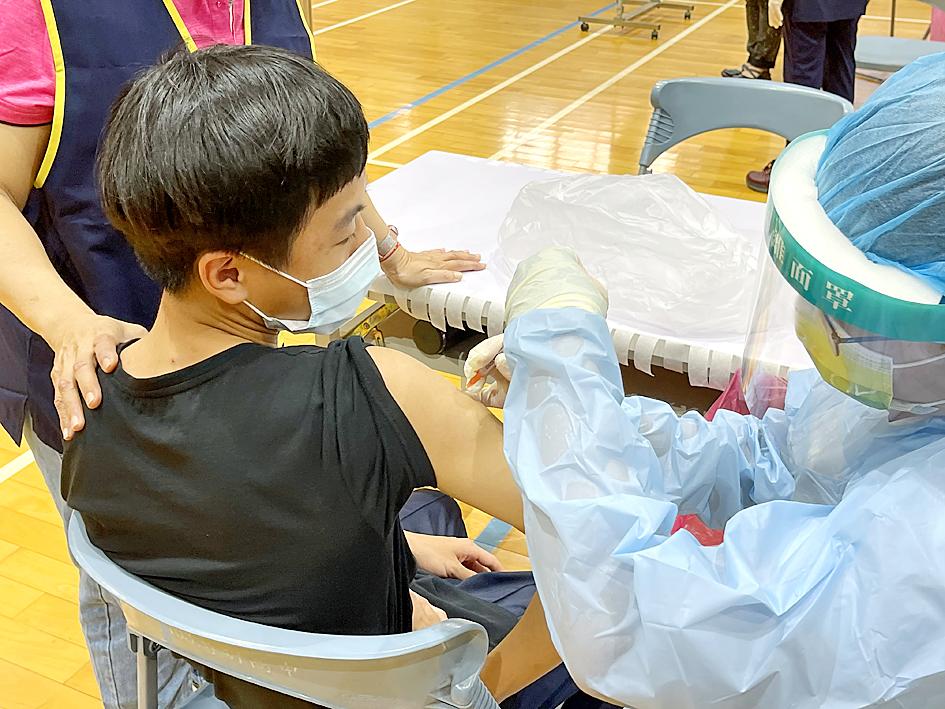The Central Epidemic Command Center (CECC) is planning to launch an expanded COVID-19 vaccination program next month to reach a full vaccination coverage rate of more than 60 percent by the end of the year, Minister of Health and Welfare Chen Shih-chung (陳時中) said yesterday.
Chen, who heads the CECC, made the announcement during a question-and-answer session at the legislature in Taipei alongside Premier Su Tseng-chang (蘇貞昌).
Chinese Nationalist Party (KMT) Legislator Chiang Wan-an (蔣萬安) asked whether the government’s strategy is to achieve “COVID-19 zero” or “to coexist with COVID-19,” as the strategy would affect regulations.

Photo: Su Meng-chuan, Taipei Times
“At present, Taiwan is actually very safe, as border control measures and local contact tracing have been conducted thoroughly, so the goal is to achieve ‘COVID-19 zero,’” Su said.
He said if the COVID-19 situation in Taiwan remains under control and if the virus does not undergo a major mutation, then COVID-19 might gradually become like the seasonal flu and the goal could then be “to coexist with COVID-19.”
“The current goal is to achieve COVID-19 zero, but Taiwan must also be prepared to coexist with COVID-19,” Chen said, adding that the CECC’s measures aim to build “resilience” in disease prevention — finding a balance between levels of restrictions while avoiding pandemic fatigue, and reducing harm to the economy.
Asked by Chiang when the government expects to achieve herd immunity, Chen said that “no one talks about achieving herd immunity nowadays, but rather how vaccination can reduce severe COVID-19 and death. The center’s goal is to achieve a full vaccination coverage rate of more than 60 percent by the end of the year.”
He said the short-term goal is to achieve a first-dose vaccination coverage rate of more than 70 percent and a full vaccination coverage rate of more than 30 percent by the end of this month.
Chiang also asked about the criteria for lowering a nationwide level 2 COVID-19 alert and when the center expects to meet them.
There are a few aspects that must be taken into consideration, Chen said, including the number of new locally transmitted cases with unclear infection sources, the responsiveness of the healthcare system, the full vaccination rate of people aged 65 or older and high-risk people, the public’s compliance level with the guidelines and changes in the global COVID-19 situation.
It is difficult to predict when the alert level would be lowered, but the criteria are being discussed with specialists, he said.
Chiang said that while more than 720,000 people in Taiwan have received the COVID-19 vaccine produced by Taiwanese firm Medigen Vaccine Biologics Corp (高端疫苗), the brand is not recognized by the US, which next month is to require international visitors to be vaccinated to enter the nation.
People from Taiwan have not been banned from entering the US in the past year and Taiwan has not been listed as a high-risk area for COVID-19 infection, Chen said, adding that the government would continue negotiating with the US government on the issue.

The CIA has a message for Chinese government officials worried about their place in Chinese President Xi Jinping’s (習近平) government: Come work with us. The agency released two Mandarin-language videos on social media on Thursday inviting disgruntled officials to contact the CIA. The recruitment videos posted on YouTube and X racked up more than 5 million views combined in their first day. The outreach comes as CIA Director John Ratcliffe has vowed to boost the agency’s use of intelligence from human sources and its focus on China, which has recently targeted US officials with its own espionage operations. The videos are “aimed at

STEADFAST FRIEND: The bills encourage increased Taiwan-US engagement and address China’s distortion of UN Resolution 2758 to isolate Taiwan internationally The Presidential Office yesterday thanked the US House of Representatives for unanimously passing two Taiwan-related bills highlighting its solid support for Taiwan’s democracy and global participation, and for deepening bilateral relations. One of the bills, the Taiwan Assurance Implementation Act, requires the US Department of State to periodically review its guidelines for engagement with Taiwan, and report to the US Congress on the guidelines and plans to lift self-imposed limitations on US-Taiwan engagement. The other bill is the Taiwan International Solidarity Act, which clarifies that UN Resolution 2758 does not address the issue of the representation of Taiwan or its people in

US Indo-Pacific Commander Admiral Samuel Paparo on Friday expressed concern over the rate at which China is diversifying its military exercises, the Financial Times (FT) reported on Saturday. “The rates of change on the depth and breadth of their exercises is the one non-linear effect that I’ve seen in the last year that wakes me up at night or keeps me up at night,” Paparo was quoted by FT as saying while attending the annual Sedona Forum at the McCain Institute in Arizona. Paparo also expressed concern over the speed with which China was expanding its military. While the US

SHIFT: Taiwan’s better-than-expected first-quarter GDP and signs of weakness in the US have driven global capital back to emerging markets, the central bank head said The central bank yesterday blamed market speculation for the steep rise in the local currency, and urged exporters and financial institutions to stay calm and stop panic sell-offs to avoid hurting their own profitability. The nation’s top monetary policymaker said that it would step in, if necessary, to maintain order and stability in the foreign exchange market. The remarks came as the NT dollar yesterday closed up NT$0.919 to NT$30.145 against the US dollar in Taipei trading, after rising as high as NT$29.59 in intraday trading. The local currency has surged 5.85 percent against the greenback over the past two sessions, central